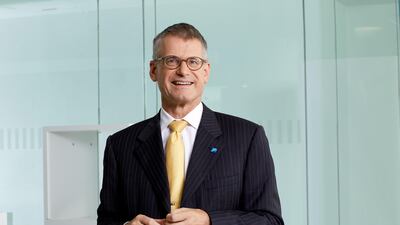Pore through the world’s Top 50 league table of chemicals producers and you may be hard-pressed to find a mention of Abu Dhabi. That is set to change.
"If you look at it, Abu Dhabi Inc is actually No 2 in the world of olefins and polyolefins, [one of the largest petrochemicals sectors], behind only ExxonMobil," says Mark Garrett, the chief executive of Vienna-based Borealis, which is majority owned by Abu Dhabi's strategic investment fund, Mubadala Investment Company, and the anchor company of its petrochemicals portfolio.
By Abu Dhabi Inc, Mr Garrett is referring to the combined operations of Borealis, which last year had gross sales of €9 billion (Dh37.9bn) plus Calgary-based Nova Chemicals, with as much as US$4bn in annual sales, the petrochemicals division of Spain-based Cepsa, which sells about €3bn of product a year, and the growing petrochemicals interests of Abu Dhabi National Oil Company (Adnoc).
The latter includes Adnoc's 60/40 joint venture with Borealis, Borouge, which yesterday announced a plan to double capacity at its complex in Ruwais, in Abu Dhabi's Western Region.
Also in the mix is Austrian integrated oil “mini major” OMV, which owns the 36 per cent of Borealis not owned by Mubadala, and is in turn 25 per cent owned by Mubadala. OMV’s two big refineries – at Schwechat, near Vienna, and at Burghausen, west of Munich – are fully integrated with Borealis petrochemicals plants.
Add all that up and you have about $20bn in annual sales, which puts Abu Dhabi Petrochemicals Inc among the world's top chemicals players, up near Germany's Bayer, which has a market capitalisation above €90bn.
A combined group would make a tempting initial public offering prospect down the road. That has not been lost on Abu Dhabi's leadership, whose portfolio strategy is aimed at leveraging the country's natural oil wealth as it vies to prepare the country for a post-oil era.
“Ipic – now Mubdadala [since they merged in May] – and OMV have always said that an IPO of Borealis at some point in time could come on the cards,” says Mr. Garrett. “Now, I’m saying I think Abu Dhabi will step back and look at all of its petrochemicals assets and say: ‘could we put these together in another way and maybe look at involving public markets?’”
There are two big strategic rationales for a consolidated organisation: to give it the weight needed to raise financing, a competitive edge in the market, in addition to mitigating against competitive risks.
“In our industry, you have to be able to fund these massive projects,” says Mr Garrett. Borealis is committed to the Borouge expansion, which will cost an estimated $10bn by the time it is completed around 2023, he adds. The company also recently announced it will partner with sister company Nova to co-invest with France’s Total on a $3.2bn US petrochemicals joint venture on the US Gulf of Mexico coast, next to Total’s Texas refinery.
“Small companies can’t do those investments and that’s what also protects us from the competition,” he says.
Mr Garrett, an Australian who joined Borealis about 10 years ago, says he has watched the Borouge joint venture mature into a world-class player.
“When we did Borouge 1 it was like a little kid learning to walk,” he says. “Borouge 2 and 3, those were the teenage years, and now we’re entering adulthood.”
The Borouge 4 expansion will put it on a par with Borealis' Scandinavian plants by giving it the option to run liquid as well as gas feedstock from Adnoc's refinery next door, as well as giving it a wider range of products. As Mr Garrett explains, by being able to run algorithms to take maximum advantage of the ebb and flow of world feedstock and end-product chemicals prices, Borouge will be among the most fleet of foot and price-competitive players, especially for markets in China and other parts of Asia.
Already, Borouge has a facility in Shanghai that is able to take its product and process it further to make a range of parts that go into China’s rapidly growing automobile markets, as well as for building and other infrastructure.
Adnoc and a number of its peers, including Saudi Aramco, have prioritised petrochemicals because it helps them hedge against a world of chronically low oil prices and because it makes basic economic sense: petrochemicals markets are growing at about 1 per cent above the rest of the economy in most major markets.
The region’s petrochemicals capacity has experienced double-digit annual growth for nearly two decades, but there is now a sense of urgency to reach scale – there is already large-scale consolidation within the industry, such Dow Chemical’s $145bn merger with DuPont.
“Sultan Al Jaber has taken a very dynamic approach since he took over” as chief executive at Adnoc at the beginning of last year, says Mr Garrett, noting that approval of Borouge 4 and the smaller PP5 expansions were much speedier than previous projects.
"Our partnership with Adnoc is being used as sort of a model for the things they are doing," says Mr Garrett, referring to the new openness Adnoc has shown to new types of partnerships and financing.
The Borouge 4 expansion may not be funded just by the partners, as previous expansions were, but may bring in more innovative project financing. It may also bring in partners down the road who can add further value to its expanded slate of products, perhaps from within Abu Dhabi Petrochemicals Inc.
Most importantly for Abu Dhabi are the opportunities for technology transfer, cultivating talent and diversifying the economy. The building phase of the previous Borouge project – the $4bn Borouge 3 – employed about 28,000 during the building phase and Mr Garrett says the new phase would be about the same.
It is expected to add up to 700 permanent jobs to the current Borouge workforce of about 3,000.

